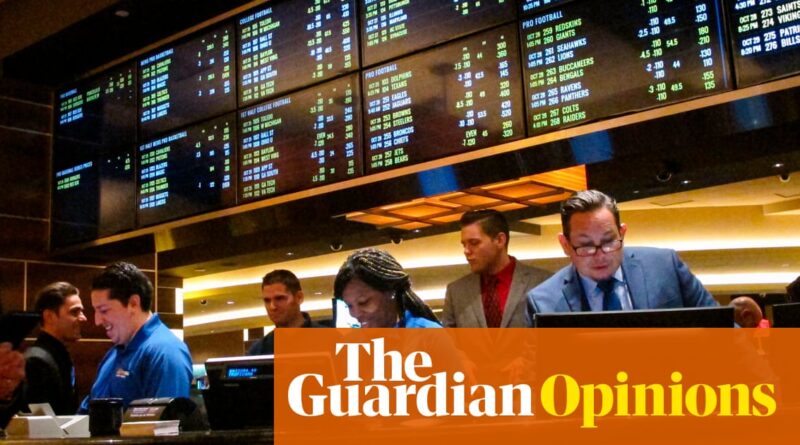Gambling’s glory blinds US policymakers to its social costs | Felicia Grondin
This gambling industry contributes billions to the US economy, provides jobs and has become a popular form of entertainment. Lawmakers and government officials are celebrating the huge tax revenue generated by this growing industry.
But this financial issue should not overshadow the importance of dealing with the growing number of people with gambling problems.
As income from gambling has increased in recent years, the need for prevention and treatment of gambling is increasing. Since gambling was legalized in New Jersey in 2018, calls to our 800-Gambler problem gambling helpline have increased by 277%: a clear sign that we are in the midst of a crisis. of public health. The Council on Compulsive Gambling of New Jersey, which I chair, has increased its 2024 treatment budget by 22%.
Industry – and, to some extent, civil servants – have largely avoided this issue. Instead of acknowledging the problems that have arisen, they have instead chosen to focus on preventing the issues from occurring. Much of this is listed in “responsible gambling” measures, which allow gamblers to set limits on the amount of dollars and time spent gambling.
The lack of attention to problem gambling and the associated social costs calls into question the very precarious economic nature of the recent explosion of legalized gambling.
The pervasive stigma and lack of physical symptoms, such as those seen with drug abuse, is why gambling addiction is often referred to as a “hidden addiction”.
Think about it: after watching many, repetitive commercials that present a fun, exciting event, with offers to bet for free, and the message “you can’t lose” , the person decides to bet his first. Perhaps reassured by the “responsible gambling” messages promoted by industry and government regulators, they have every intention of gambling responsibly.
When they bet for the first time, they win, get an adrenaline rush and get hooked on the game. They continue to place more bets, win more, then start losing, and eventually the principles of “responsible gambling” fall by the wayside. After a short time, they are trapped and find themselves on the way down. Because of the shame they may face when they say they are addicted, they keep the secret to themselves, not thinking about its effect on their loved ones.
According to the California Council on Problem Gambling, the average problem gambler affects seven people who are close friends. In an effort to recoup the losses, they continue to draw down college and retirement accounts and obtain second mortgages, perhaps without their families’ knowledge. They hide their addiction out of a sense of failure and don’t believe they have a problem until they hit the ground running, after the damage has been done.
Problem gambling is perpetuated by our pro-gambling culture, which glorifies gambling and hides its dark side. Outside of advertisements that include small (and often legal) references to the helpline, the public is rarely informed of the damage this addiction can cause.
In an effort to exercise some measure of social responsibility, industry and government have promoted “responsible gambling” as a means of promoting good gambling practices.
This serves as a cover-up for industry and government. In addition, curbing problem gambling can negatively affect the financial health of the industry – and the associated tax revenue it generates.
The industry often removes two important letters from its references to “game”, which becomes “game” in most of its messages. This small change of words tries to hide the essence of gambling: that it involves risk.
As words are silenced and problem gambling is minimized, the seriousness of the problem continues to be hidden. More and more people, oblivious to its negative side, develop gambling problems that result in stressful situations.
By simply promoting “responsible gambling”, the industry and our legislators are participating and benefiting from the “hidden” side of this addiction.
The gambling industry is very lucrative and provides much needed tax revenue. This limited financial perspective, however, does not take into account the negative social impact of problem gambling.
According to the National Council on Problem Gambling, the annual societal cost of illegal gambling in the US – including the loss of jobs and justice related to gambling – is up to $14bn . And this number does not account for those who lost their homes, savings and relationships, and were forced to start bank accounts. The most disturbing statistic is that approximately 19.2% of those struggling with a gambling problem have considered suicide, according to the survey, which is the highest of any addiction.
The Guardian reported in January that some economists warned that the cost of high-level betting could be “roughly equal” to what the country takes in and suggested that the rate of economic profit in fact it can be amazing.
Although the economic benefits of gambling are questionable, the need for greater attention to the public good is now undeniable. Problem gambling has become a public health problem. The public must be made aware. This addiction should be taken seriously. Government officials must also be aware of the problems involved.
More funding for prevention and treatment is desperately needed. Custom ad settings are out of date. Warning labels, similar to those for tobacco products, should be placed in brick and mortar casinos and online gambling sites. It is also important that public service announcements are made to educate the public about the addictive nature of gambling.
Without these improvements, gambling addiction will continue to grow, leaving millions of victims.
#Gamblings #glory #blinds #policymakers #social #costs #Felicia #Grondin
